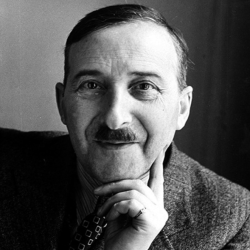
Stefan Zweig
Austrian writer
| Date of Birth | : | 28 Nov, 1881 |
| Date of Death | : | 22 Feb, 1942 |
| Place of Birth | : | Vienna, Austria |
| Profession | : | Writer |
| Nationality | : | Austrian |
Stefan Zweig was an Austrian writer who achieved distinction in several genres—poetry, essays, short stories, and dramas—most notably in his interpretations of imaginary and historical characters.
Zweig was raised in Vienna. His first book, a volume of poetry, was published in 1901. He received a doctorate from the University of Vienna in 1904 and traveled widely in Europe before settling in Salzburg, Austria, in 1913. In 1934, driven into exile by the Nazis, he emigrated to England and then, in 1940, to Brazil by way of New York. Finding only growing loneliness and disillusionment in their new surroundings, he and his second wife committed suicide.
Zweig’s interest in psychology and the teachings of Sigmund Freud led to his most characteristic work, the subtle portrayal of character. Zweig’s essays include studies of Honoré de Balzac, Charles Dickens, and Fyodor Dostoyevsky (Drei Meister, 1920; Three Masters) and of Friedrich Hölderlin, Heinrich von Kleist, and Friedrich Nietzsche (Der Kampf mit dem Dämon, 1925; Master Builders). He achieved popularity with Sternstunden der Menschheit (1928; The Tide of Fortune), five historical portraits in miniature. He wrote full-scale, intuitive rather than objective, biographies of the French statesman Joseph Fouché (1929), Mary Stuart (1935), and others. His stories include those in Verwirrung der Gefühle (1925; Conflicts). He also wrote a psychological novel, Ungeduld des Herzens (1938; Beware of Pity), and translated works of Charles Baudelaire, Paul Verlaine, and Émile Verhaeren.
Quotes
Total 20 Quotes
In history as in human life, regret does not bring back a lost moment and a thousand years will not recover something lost in a single hour.
Only the person who has experienced light and darkness, war and peace, rise and fall, only that person has truly experienced life.
It is never until one realizes that one means something to others that one feels there is any point or purpose in one's own existence.
Time to leave now, get out of this room, go somewhere, anywhere; sharpen this feeling of happiness and freedom, stretch your limbs, fill your eyes, be awake, wider awake, vividly awake in every sense and every pore.
Freedom is not possible without authority - otherwise it would turn into chaos and authority is not possible without freedom - otherwise it would turn into tyranny.
No guilt is forgotten so long as the conscience still knows of it.
All I know is that I shall be alone again. There is nothing more terrible than to be alone among human beings.
Every wave, regardless of how high and forceful it crests, must eventually collapse within itself.
Health alone does not suffice. To be happy, to become creative, man must always be strengthened by faith in the meaning of his own existence.
Memory is so corrupt that you remember only what you want to; if you want to forget about something, slowly but surely you do.
